It was a big deal. So, what's happened since Alberta and Ottawa agreed to spend $678M on housing?
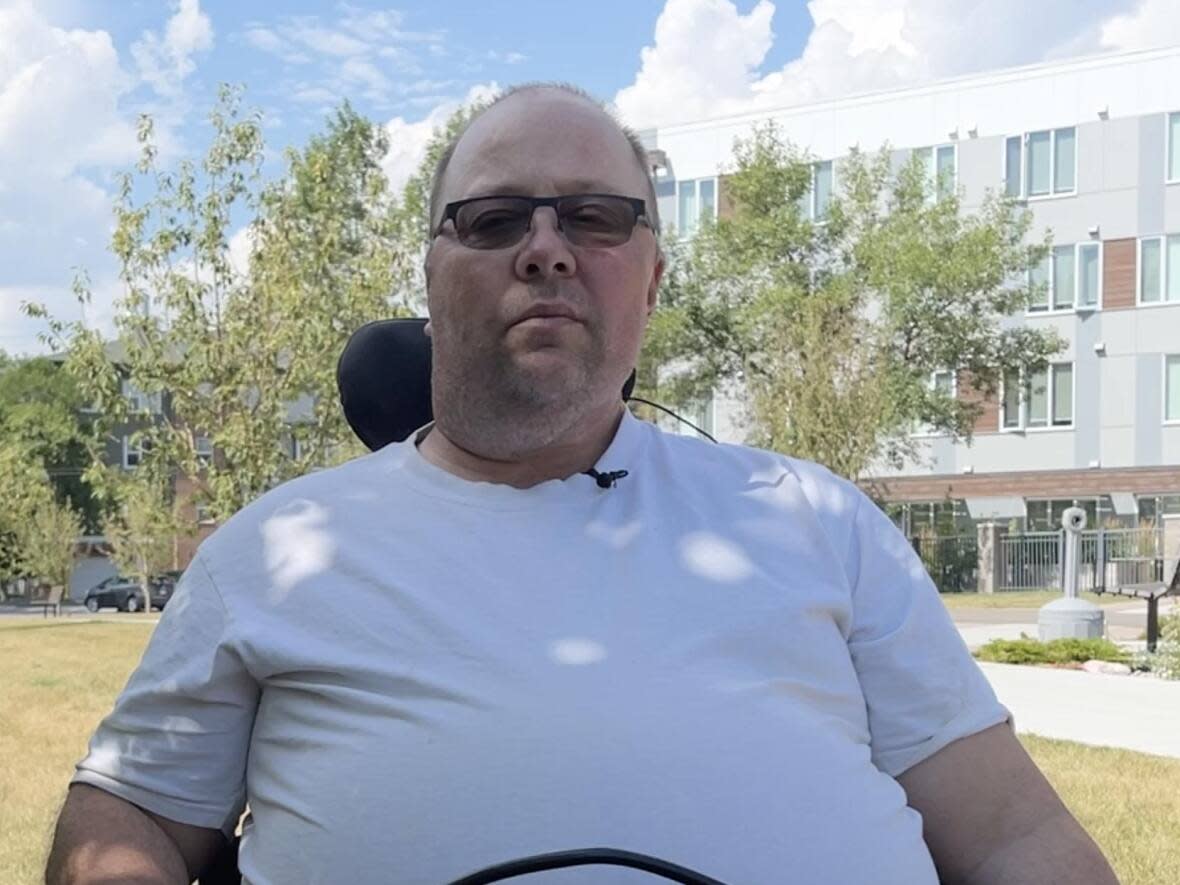
Cory Kish, 47, was hunting with a friend west of Calgary in November 2020 when he fell more than four metres from a tree stand, a perch that hunters attach high up in a tree. He broke his neck and is now paralyzed from the chest down.
"I was hunting out of a tree stand and I went to get out and I stepped on a branch that I stepped on getting in, and that branch broke," Kish said.
"I went down and I landed on my neck," he said.
He spent eight months in hospital recovering before being transferred into a two-bedroom, accessible apartment that costs $730 a month. He lives in Bishop's Manor, a five-storey affordable housing development in the northeast community of Bridgeland.
The cabinets, countertops and cooktop move up and down to accommodate Kish, who is in a wheelchair.
"I'm coming along pretty good. I'm still doing rehab, trying to strengthen [my] hands and arms and everything."
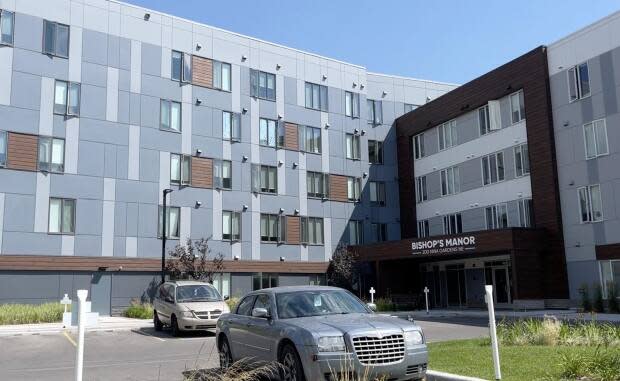
When he was released from the hospital in the summer of 2021, the former carpenter was unable to work and was immediately transferred to Bishop's Manor, where other residents say the wait-list to get in is measured in years, not months.
"If I didn't have this, I don't know where I'd be. I'd probably be out in the streets or somewhere," he said.
Wait-list doubles in a decade
It's a challenge for Calgarians and other Albertans to find an affordable place to live.
In the spring of 2021, the provincial government said there were 24,000 people who cannot afford private sector accommodation and whose names have been added to a wait-list. That's double what it was 10 years ago.
The average non-market housing supply among major Canadian cities is six per cent; however, in Calgary it's 3.6 per cent.
"That translates to about 15,000 units over the next 10 years that's needed just for us to catch up to other big cities," said Bernadette Majdell, the chief operating officer of HomeSpace, a charitable real estate developer, rental housing owner and property manager.
The organization manages 765 units, with another 150 under construction, including an office conversion that will create 82 affordable housing units in downtown Calgary.
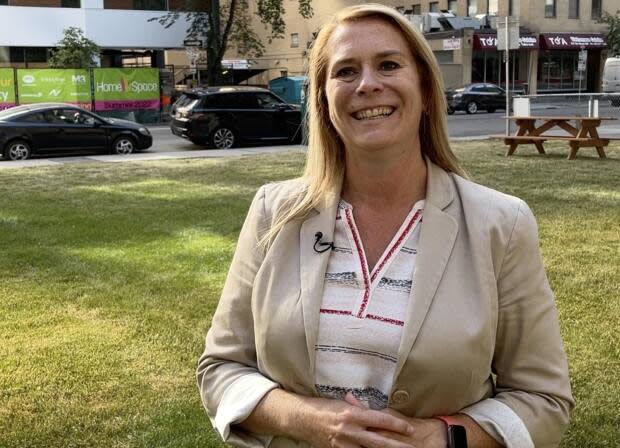
Affordable housing comes in all shapes and sizes, from studio suites to three- and four-bedroom apartments, to single family homes. Other low-income Albertans who don't necessarily live in social housing receive a direct rent subsidy. To qualify for a non-market, one-bedroom affordable apartment, household income would have to be less than $44,000 per year in Calgary.
The government-owned Alberta Social Housing Corporation provides housing for 110,000 people across the province. The units are managed by dozens of agencies, including the Calgary Housing Company (CHC), owned by the city.
CHC is the city's biggest landlord with nearly 24,000 tenants in 7,200 units. Another 2,500 households receive rent subsidies. The wait-list for CHC housing is expected to surpass 6,000 later this month.
Big agreement, big numbers
In March 2019, the former NDP government signed a $678-million agreement with the federal government to "protect, renew and expand social and community housing in Alberta" for 10 years.
So, what's been done since then?
The Canada Mortgage and Housing Corporation, which oversees the National Housing Strategy, says $140 million has been invested since the agreement was signed.
It says the money has been spent on the construction, repair or subsidization of over 31,000 housing units, including 721 new units under the housing priority initiative.
But getting specifics can be difficult to track.
A news release in 2021 announced the approval of $16.6 million under a "rapid housing"' initiative for 60 new housing units in Calgary, but no other details were provided, including the location or who applied for the funding.
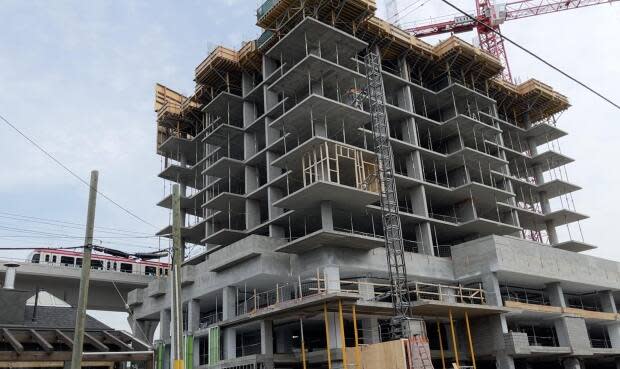
Alberta's Minister of Seniors and Housing Josephine Pon was unavailable for an interview, but a spokesperson for the department says 667 seniors and affordable housing units in 19 projects are under construction at a cost of $113 million.
Over the past two years, 2,254 family, community, seniors and affordable housing units in 34 projects totalling $459 million have been completed. That includes 350 shelter spaces.
The provincial total includes federal funding, so the provincial amount works out to $418 million, according to the spokesperson. The federal amount, according to the minister's office, is $154 million, higher than the number provided by CMHC. It's quite an imbalance for an agreement that was billed as a dollar-for-dollar funding deal.
The provincial government says it has also brought in a number of measures, including a redesigned rent supplement program, an online tool to help Albertans find affordable housing, incentives for housing providers to take ownership of affordable housing projects and a expanded the rent assistance benefit to 80 communities.
The Opposition NDP says the government needs to spend more on affordable housing.
"There's many people who can't access it. There's a huge wait-list in many facilities, and the direction the UCP are going is just completely wrong," said Lori Sigurdson, the MLA for Edmonton-Riverview. She's the former minister of housing who signed the $678 -million agreement with Ottawa.
The direction she's referring to is the UCP government's new strategy.
New housing strategy
Since the agreement was signed, the UCP government introduced a 10-year affordable housing strategy called Stronger Foundations. The goal is to create an additional 25,000 affordable housing units over the next decade. The plan is part of Bill 78, which was passed into law this past spring.
One of the recommendations calls for the government to shift from owner and operator of its 26,700 units to that of a funder and regulator.
A government spokesperson says to date no units have been sold.
A 'very ambitious goal'
How will the government achieve its goal of reaching 25,000 units over the next decade? It's a tall order, according to a member of the province's Affordable Housing Review panel that came up with 19 recommendations that formed part of the new strategy.
"I'm not sure, this is really, a very ambitious goal," said Sasha Tsenkova, a professor of planning at the School of Architecture, Planning and Landscape at the University of Calgary.
Tsenkova says that while building new affordable housing is part of the solution, it's not the only one.
She says existing assets need to be better utilized and managed, along with more housing benefits and rent subsidies to give people quicker access to affordable accommodations.
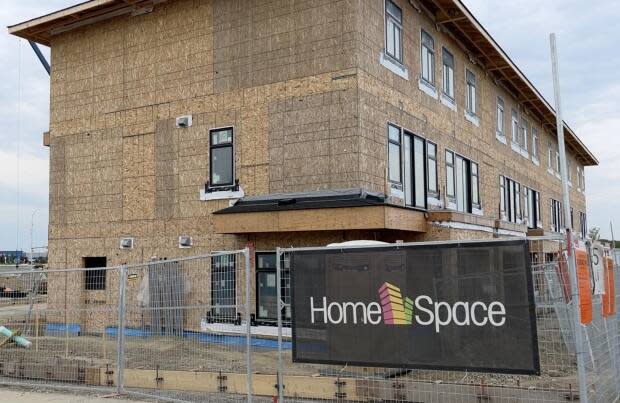
The government says of the 25,000 units, 13,000 will be new builds, while the remaining 12,000 households will be supported through rent supplements.
Tsenkova says for the province to move away from direct ownership of social housing is something that will have to be done with caution. She says the government must retain the role of regulator to oversee non-profit and private sector operators.
"It needs to be done with a lot of attention to detail and the particular outcomes for people and the tenants, the living experiences of the people are extremely important," she said.
She would also like to see more projects include a mix of incomes, to avoid segregating and stigmatizing low-income Albertans. She says HomeSpace's office conversion project is a step in the right direction.
Sense of community
HomeSpace purchased a 10-storey, 100,000-square-foot building and is in the final stages of converting the former headquarters of Dome Petroleum into 82 affordable housing units for 200 people, including families, seniors, Indigenous people and new Canadians. Inn from the Cold will have shelter space in the building.
Majdell says rent for every tenant will be 37 per cent below market value. It's expected to open in September.
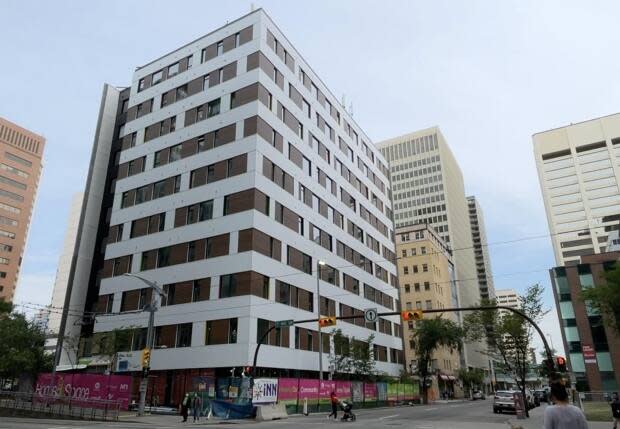
HomeSpace is also overseeing the construction of 45 units of affordable housing in the southeast community of Seton. The stacked townhouses will include one-, two- and three-bedroom units at 20 per cent below market rates. Construction is expected to wrap up later this year or early 2023.
Majdell says that while her organization is busy building 150 new units, much more needs to be done to help thousands of people who are trying to access affordable housing.
"The biggest challenge is that in order to make affordable housing work, money has to come from somewhere. So whether that's provincial, federal, municipal or donors, it's a collective effort in order to build new units and make them affordable."
Bryan Labby is an enterprise reporter with CBC Calgary. If you have a good story idea or tip, you can reach him at bryan.labby@cbc.ca or on Twitter at @CBCBryan.


